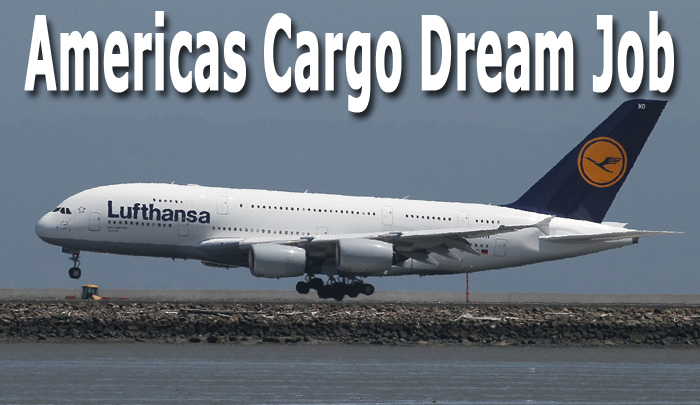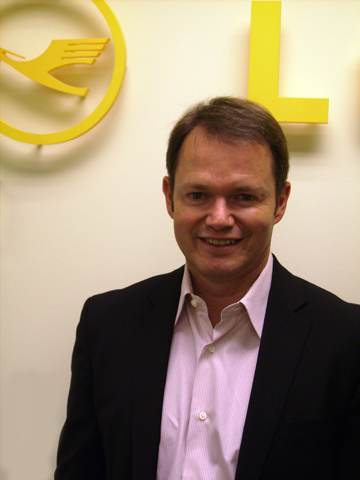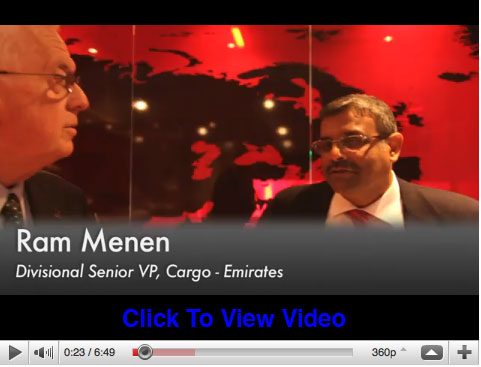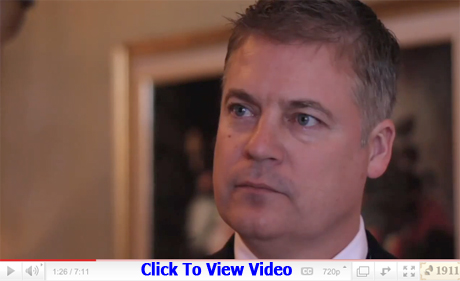At Lufthansa
Cargo—Americas Cargo Dream Job
 We
sit down with Achim Martinka, Lufthansa Cargo Vice President the Americas
in Buckhead—Atlanta’s “in” neighborhood—where
the Lufthansa Cargo offices are located. We
sit down with Achim Martinka, Lufthansa Cargo Vice President the Americas
in Buckhead—Atlanta’s “in” neighborhood—where
the Lufthansa Cargo offices are located.
Time has quickly marched on from that
cold, snowy New York day in January when we first met at his inaugural
press briefing.
And the difference is not just that
it is a hot Atlanta summer afternoon in 2011 – Achim has grown
into what he terms his “dream job,” which he visibly enjoys
and is so much more relaxed talking about.
It is his 6th career move, and he says
he is well adjusted to the rhythm of starting up in a new position
and hitting the ground running, living up to new challenges every
day. Achim manages a staff of 500 and travels extensively among the
U.S. gateways, which take up a good 2/3 of his time and efforts, and
the “rest” of the Americas.
What also makes his work challenging
and interesting is that the issues differ so much within the U.S.
stations and further south. The net result though is that he spends
6-8 days a month in his Atlanta head office and the bulk of the time
on the road, meeting customers, staff and attending various functions.
Achim says, “I have a great team
—5 regional managers: Christian Haug, based in New York for
the East Coast; Dieter Vranckx, in Chicago for Canada and the Midwest;
Veli Polat, in LA for the West Coast and Mexico, Carl Unger, in Atlanta
for Southern U.S.A. excluding Florida and SAO which is handled by
Daniel Bleckmann. “Further supporting functions are handled
by 5 team-leaders, Toni Pattaca for Central Revenue Management and
After Sales Service, Daniela Mendez for HR, Alison Ricker for Key
Account Management and Vishal Bhatnagar for Handling and Processes.”
Lufthansa Cargo added Houston as a new
destination and actually increased frequency to twice weekly since
June this year without impacting its Dallas flights.
“We have successfully opened 3
new freighter-stations in the first 6 months of 2011, MAO, IAH, BQN.
We will further extend our network in the winter period with the opening
of Rio de Janeiro with PAX-flights and additional Cargo frequencies
to LAX, MEX, VCP/UIO/BOG.”
The current market provides unique opportunities
to Lufthansa Cargo, in Achim’s view, in particular because of
a good balance of Atlantic flights in the face of weakening Asian
markets and continued record German exports. When additional capacity
is needed, Jade aircraft is being used with 012 air waybills, which
provide a degree of internal flexibility, albeit on competitive terms.
Lufthansa Cargo has a program consisting
of 12 global partners managed by each of its respective four areas
– Germany, Europe and Africa, Asia and the Americas. The quality
initiative first implemented in Germany has been rolled out in the
Americas and the 2011 award winner ceremony is planned for mid-October.
When asked what surprised him, Achim
says the realization that the U.S. is not really one homogenous market,
but rather an amalgam of gateway specific situations; whether it’s
the East Coast, LAX, IAH or ORD, each differs, gateway by gateway,
very much like what he experienced in Europe. While in general the
U.S. market is saturated and each carrier fights for its market share,
elsewhere, in Mexico and Brazil for example, it’s a growth market.
The day-to-day challenges differ in Manaus vis-à-vis Houston,
from ramp handling in one to e-freight in the other.
The vast majority of his staff is on
local contracts, which reflects the markets the airline serves. Achim
is intent on building up the American potential, particularly on the
management side.
Talking about what lies ahead in 2012,
Achim sees the focus on consolidating the gains made in 2011 and the
positive results that have been achieved while planning for a slight
increase overall.
Lastly, we ask this busy and dynamic
executive, who has been growing much more comfortable in his skin,
what he does to relax. Achim is all smiles as he tells me he has finally
found a soccer team he will play on. With a young family—his
children are one and three—spending time with loved ones is
what he likes to do most.
Ted Braun
|



